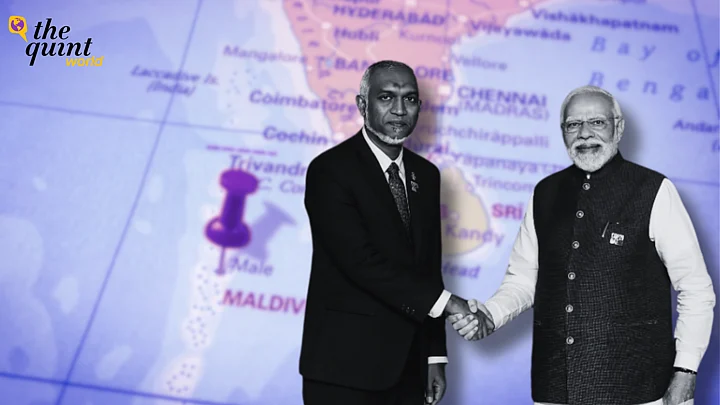"The Indian side presented multiple options for workable solutions to our differences with Malé, none of them seem to have been deemed acceptable," sources in the Ministry of External Affairs told The Quint a day after Maldives President Mohammed Muizzu formally asked India to withdraw its military personnel from the island nation by 15 March.
Public Policy Secretary at the Maldivian President's office Abdulla Nazum Ibrahim addressed a press conference and said, “Indian military personnel cannot stay in the Maldives. This is the policy of President Dr Mohamed Muizzu and that of this administration."
Malé and New Delhi had set up a high-level core group back when PM Modi met Muizzu on the sidelines of COP-28 Summit, to negotiate the withdrawal of troops, and the group's first meeting took place on Sunday, 14 January, which saw the presence of the Indian High Commissioner, Diplomats and the Defence Attaché at the Maldives Foreign Affairs Ministry Headquarters in Malé.
According to the latest figures, 88 Indian military personnel, two HAL Dhruv helicopters and a Dornier aircraft for humanitarian purposes, are present in the Maldives. Indian troops have been stationed in Maldives to trian their military in combat and reconnaissance, and rescue-aid operations.
In the last five years, Indian personnel have successfully carried out over 500 medical evacuations in the Maldives, resulting in the saving of 523 lives. This year alone, there have been 131 evacuations, with 140 and 109 evacuations in the preceding two years.
In the past year, 122 missions were conducted, with 152 and 124 missions undertaken in 2021 and 2020, respectively, WION reported.
While the Indian readout of the meeting said that the two sides worked on "finding a mutually workable solution to enable continued operation of Indian aviation platforms that provide humanitarian and medvac services," the statement from Maldives, additionally stated:
"Both sides expressed willingness to intensify cooperation and agreed to fast-track the withdrawal of Indian military personnel."
However, there remains some lack of clarity regarding when an agreement to withdraw the Indian military was reached since President Muizzu claimed that, after dialogue with the Indian government, an agreement was reached in December 2023.
Moreover, the readout from the Indian MEA made no mention of an agreement between the two sides.
Commenting on the first meeting, sources told The Quint, "We believed, and suggested, that a more nuanced approach be applied to the withdrawal of our troops because our policy remains in maintaining regional stability, for which we ask that our partners follow similar practices of co-operation."
The Timing
The move comes a day after Muizzu returned from his five-day visit to China and just a few days after a diplomatic spat over social media posts by the now-suspended Maldivian ministers against Prime Minister Narendra Modi.
On Saturday, 13 January, he told reporters that Maldives might be a small country “but this doesn’t give them the license to bully us.”
In an apparent jibe at India, Muizzu said, "We aren't in anyone's backyard...This ocean does not belong to a specific country. This (Indian) Ocean also belongs to all countries situated in it."
Besides holding bilateral talks with Chinese President Xi Jinping, Muizzu’s China visit was marked by signing 20 agreements, an aid of $130 million to Maldives, and a joint statement which read:
"China firmly supports the Maldives in upholding its national sovereignty, independence and national dignity, respects and supports the Maldives' exploration of a development path that suits its national conditions, and firmly opposes external interference in the internal affairs of the Maldives."
Back in November 2023, when Muizzu took office, The Quint reported on his meeting with Union Minister Kiren Rejiju, where the former said that the reason behind the request to withdraw the Indian military was "the Maldivian people [who] had given him a strong mandate to make the request to India..."
The Quint also spoke to a diplomatic source privy to details of talks held between Malé and New Delhi since Muizzu took office and said, "Without commenting on the politics, anti-India sentiments have always been present to some extent in the Maldives, but it has only heightened over the last few months."
Importantly, the source said:
"At a time where we can see a shift in how Malé is positioning itself in the Global South, the presence of even a few handfuls of Indian soldiers play have been portrayed a threat to their national security."
They further mentioned that Muizzu's visit to China was a thorn in New Delhi's side, given that they "expected that traditions be followed."
Muizzu chose Turkiye as his first overseas visit, breaking with a longstanding tradition in his country’s diplomatic practices. He subsequently went to UAE for the COP-28 summit, where he met PM Modi, before visiting China.
Across party lines, Maldivian presidents have long made India their first port of call after being elected, in a reflection of the South Asian giant’s traditional influence on the idyllic Indian Ocean archipelago.
The Quint learnt that while "diplomatic channels were discussing the possibility of President Muizzu's visit to India, no concrete decisions have been taken by Malé."
(At The Quint, we question everything. Play an active role in shaping our journalism by becoming a member today.)
